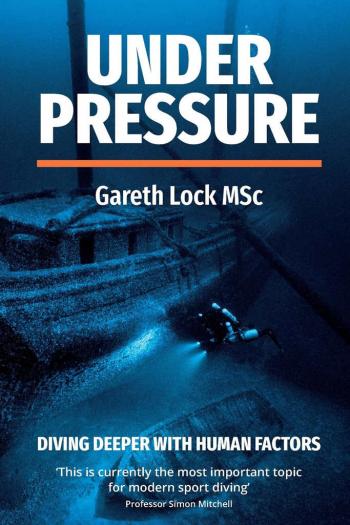A must-read from regular X-Ray Mag contributor Gareth Lock. This book contains more than 30 detailed stories from world-renown divers such as Jill Heinerth, Richard Lundgren, Steve Bogaerts and Roger Williams. The case studies and analysis show how experts can make mistakes and how they survived to tell the tale.

Paperback: 342 pages
Publisher: Human in the System Consulting (12 Mar. 2019)
Language: English
ISBN-10: 199958497X
ISBN-13: 978-1999584979
Product Dimensions: 15.2 x 1.8 x 22.9 cm
Convention states that reviewers should declare any conflicts of interest or relations with manufacturers, resort owners or authors with whom we have some sort of relationship. No problem. In fact, I am happy to declare I have never felt the slightest conflicted about Gareth Lock’s work; I immediately recognised the significance of his findings and have happily published a series of his articles over the years.
Now, his findings have been compiled into a new book, which should be made part of every diver’s curriculum, because in this book is important stuff that will make you a safer and better diver. One could say, it is all about what we can learn from other people’s mistakes in order to avoid making them ourselves.
Many of our long-term readers will be familiar with Lock, but for the benefit of latecomers, it should briefly be noted that he is a former RAF Squadron Leader, and he has applied the knowledge gained through a 25-year career in the Air Force to the significance of human errors in accidents and what can be done to prevent them.
Managing risk, while having fun
“Attributing ‘human error’ as the cause [of accidents and incidents] means we often focus on the outcomes rather than the failures in decision-making, situational awareness, communication, team work or the impact of stress and fatigue,” said Lock. “In diving, errors which are not trapped or mitigated can ultimately mean the difference between life and death.”
In the grander picture, Lock’s insights made me realise how it is often the little things, such as a sudden distraction, which constitute the first link in a chain of events leading to an accident. We all know how stage magicians use misdirection to pull off their tricks. Attention is not where it should be.
I like to think that in a similar manner, distraction, habits or presumptions can misdirect our attention when we go diving, or do other stuff for that matter. As a result, I have become far more mindful of how I go about various activities in life. Another positive side effect of these reflections is the enhanced appreciation of what I do as I have become more attentive to detail, focused on the task at hand and just being present in the experience.
New technology, smart gadgets and improved training curriculums only goes so far. We also have to improve our mindsets and how we interface with these new technologies. A sentence from the brief review on Amazon reads: “This book is a must for all divers who want to manage their risks more effectively and have fun in the process.”
I could not agree more.
What's inside the book?
Chapter 1: The Role of Human Factors and Non-Technical Skills in High-Performing Teams
Chapter 2: Systems Thinking: The Whole is Greater Than the Sum of the Parts
Chapter 3: ‘Human Error’ and Why It Isn’t That Simple
Chapter 4: Risk Management or Gambling Your Life Away
Chapter 5: Just Culture and Psychological Safety
Chapter 6: Decision-making
Chapter 7: Situational Awareness
Chapter 8: Communication
Chapter 9: Teamwork and Teaming
Chapter 10: Leadership and Followership
Chapter 11: Performance-Shaping Factors
Chapter 12: Living with Failure
Chapter 13: Bringing It All Together






















